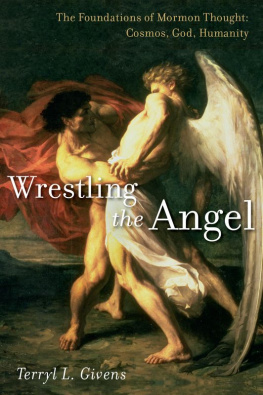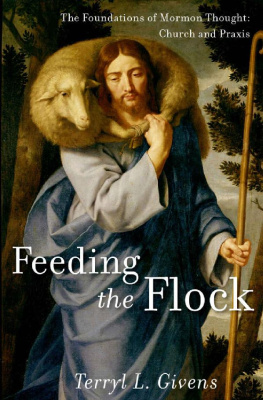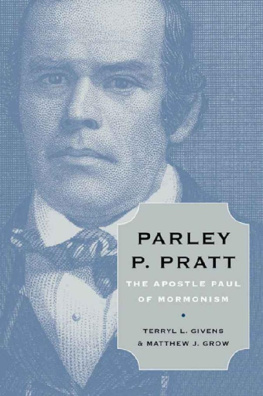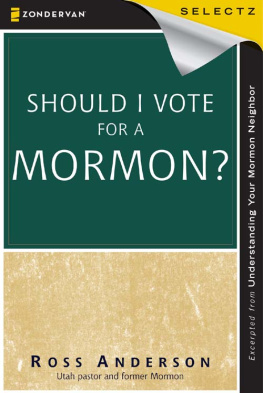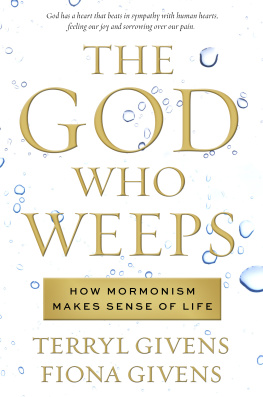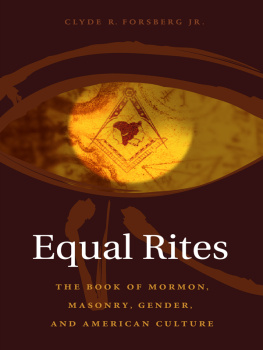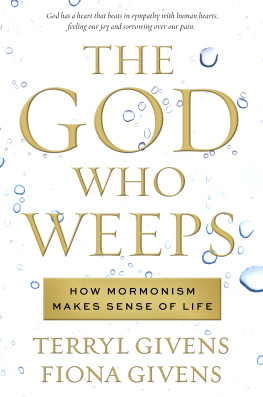WRESTLING THE ANGEL
Wrestling the Angel
THE FOUNDATIONS OF MORMON THOUGHT: COSMOS, GOD, HUMANITY
Terryl L. Givens


Oxford University Press is a department of the University of Oxford. It furthers the Universitys objective of excellence in research, scholarship, and education by publishing worldwide.
Oxford New York
Auckland Cape Town Dar es Salaam Hong Kong Karachi Kuala Lumpur Madrid Melbourne Mexico City Nairobi New Delhi Shanghai Taipei Toronto
With offices in
Argentina Austria Brazil Chile Czech Republic France Greece Guatemala Hungary Italy Japan Poland Portugal Singapore South Korea Switzerland Thailand Turkey Ukraine Vietnam
Oxford is a registered trade mark of Oxford University Press in the UK and certain other countries.
Published in the United States of America by
Oxford University Press
198 Madison Avenue, New York, NY 10016
Oxford University Press 2015
All rights reserved. No part of this publication may be reproduced, stored in a retrieval system, or transmitted, in any form or by any means, without the prior permission in writing of Oxford University Press, or as expressly permitted by law, by license, or under terms agreed with the appropriate reproduction rights organization. Inquiries concerning reproduction outside the scope of the above should be sent to the Rights Department, Oxford University Press, at the address above.
You must not circulate this work in any other form and you must impose this same condition on any acquirer.
Library of Congress Cataloging-in-Publication Data
Givens, Terryl, author.
Wrestling the angel. Volume 1, The foundations of Mormon thought: cosmos, God, humanity / Terryl L. Givens.
p. cm.
Includes bibliographical references and index.
Summary: Wrestling the Angel, Vol. I is the first in a two part study of the foundations of Mormon thought and practice, situated in the context of an overview of the Christian tradition. The book traces the essential contours of Mormon thought as it developed from Joseph Smith to the present. Terryl L. Givens, one of the nations foremost Mormon scholars, offers a sweeping account of the history of Mormon belief, revealing that Mormonism is a tradition still very much in the process of formation.Provided by the publisher.
ISBN 9780199794928 (hardcover : alk. paper) ISBN 9780199394241 (ebook) ISBN 9780199378432 (online resource) 1. Church of Jesus Christ of Latter-day SaintsDoctrines. 2. Mormon ChurchDoctrines. I. Title. II. Title: Foundations of Mormon thought.
BX8635.3.G58 2014
230.93dc23
2014001807
1 3 5 7 9 8 6 4 2
Printed in the United States of America on acid-free paper
To Tom Griffith
the kings good servant, but Gods first
A right faith is an excellent and valuable thing. But it is advantageous no further than it leads us to live an holy and godly life.
JONATHAN MAYHEW
Contents
WRESTLING THE ANGEL seems an apt image for any mortal attempt to capture in finite time and in human language the essential propositions about the nature of God, his universe, and his creations. However, this book is not a work of either systematic or historical theology per se. It is, rather, the first volume in a two-part study of the foundations of Mormon thought and practice.
I situate these foundations in the context of an overview of the Christian tradition for a particular reason: Mormonisms status as a Christian faith, and its exact relationship to Christianity, continue to be subjects of longstanding dispute. As the prominent scholar Sydney Ahlstrom remarked of Mormonism in his celebrated Religious History of the American People, one cannot even be sure if the object of our consideration is a sect, a mystery cult, a new religion, a church, a people, a nation, or an American subculture.
The Catholic and mainline Protestant churches have declared, in recent years, that Mormonism does not fit within the bounds of the historic, apostolic tradition of Christian faith. By situating Mormon thought in the context of historic Christian doctrines, I hope to illuminate what is continuous with the Christian tradition and what is radically distinct from it. I particularly delineate Protestant antecedents and parallels, since that is the religious milieu in which Mormonism appeared and that strongly influenced Smith, by way of both imitation and reaction. This comparative method may not resolve the question of Mormonisms status, but it should better inform the debate.
Though Mormonism comes out of a biblical tradition, and was strongly influenced by nineteenth-century Restorationist thought, it propounded a theology that does indeed, in many cases, diverge radically from creedal Christianity. As I will argue, its substantive differences are most evident in, and largely attributable to, a unique underlying cosmic narrative. In addition to its temporally expansive purview, Mormonism posits a distinctive cosmology and metaphysics, in which it situates an unconventional narrative of human identity and a re-envisioned divine nature. For this reason, conventional theological categories do not always accurately translate from mainline Christianity to Mormonism, and do not effectively organize the field of Mormon thought. In what follows, I use the elaboration of Mormonisms underlying cosmic narrative as this studys framework, rather than employ a topical enumeration, on the one hand, or a strict chronology of Mormon doctrines, on the other.
I am here tracing what I regard as the essential contours of Mormon thought as it developed from Joseph Smith to the present, not pretending to address the many tributaries in and out of Mormonisms main currents. Following the major lines of development to the contemporary LDS Church will emphasize the priority of Smith and the founding generation of Mormon thinkers, but reveal significant developments in subsequent decades. Because Mormons believe in an open canon, and because extra-biblical pronouncements by prophets living and dead also constitute Mormon scripture, Mormon doctrine is by definition impossible to fix; reflection on the meaning of this living, evolving tradition is, therefore, inescapably a lively and contested theological enterprise.
The Mormon faith tradition is a relative newcomer on the Christian landscape, and its academic study is in the process of significant shifts. Long considered an outlier to the standard Protestant narrative of American religion, Mormonism is increasingly seen as integral to our understanding of more than Americas westward settlement or of the political management of religious difference. Enduring fascination with its social innovations (polygamy, communalism), its stark supernaturalism (angels, gold plates, and seer stones), and its most esoteric aspects (a New World Garden of Eden, sacred undergarments) has proved wholly inadequate for understanding Mormonisms status as an enduringand thrivingbelief system born of the nineteenth centurys religious upheavals and innovations.
With this work, I hope to lend momentum to the growing effort to understand Mormonism in its historical and theological context. This volume focuses on Mormonism as a system of belief that engages, adapts, and redefines historic Christianity in ways that its adepts have found compelling. Theology is not the onlyor even the principaldimension of organized religion that constitutes a churchs identity, or accounts for its success or failure; but its an important oneone that in the case of Mormonism has historically been overshadowed by popular interest in the media-fed distractions already cited or obscured by Mormonisms own anti-creedalism and historical impatience with Protestant theology. Recent success in incorporating Mormonism into larger disciplinary narratives has done much to free the faith from a predicament similar to the Amish purgatory of simplistic horse-and-buggy caricatures. And a new generation of (primarily) young Latter-day Saint scholars have done significant work in demonstrating some of the intellectual richness and depth of Mormonisms theological heritage; this book builds on such work.
Next page
